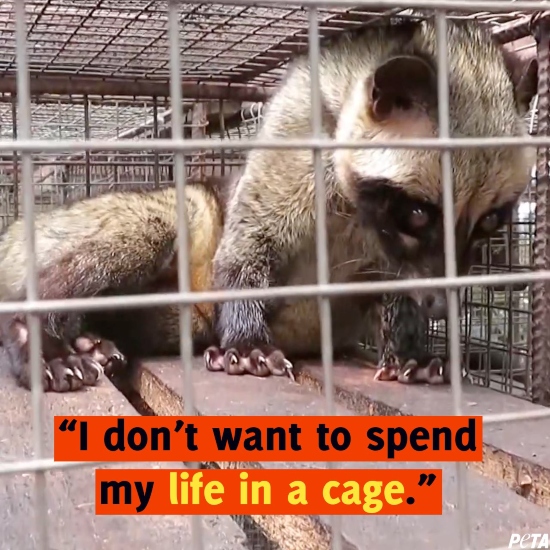UN INT Intro Text w/ Centered Large Responsive Image - *Important Note* You must UNLINK this shared library component before making page-specific customizations.
After hearing that Asian palm civet cats suffer when they’re taken from their homes in nature, shoved into cramped cages, and forced to eat unnatural amounts of coffee berries so that their excrement can be sold as kopi luwak, many businesses made the compassionate decision to pull it from their shelves.
Others, including some distributors in Japan, choose to continue profiting from animals’ misery for a novelty product that no one needs, despite having heard from PETA Asia about the rampant cruelty in the industry.

PETA investigators visited kopi luwak farms and found disturbing cruelty on every one. Nocturnal civet cats, who naturally fear humans, were confined to small wire cages with no dark place to sleep and were subjected to a constant barrage of unwanted human contact. Their cages were encrusted with feces, rotting berries, and other filth, and they panted incessantly in the heat. Numerous civet cats exhibited signs of extreme psychological distress, including pacing, and biting themselves. Investigators saw several with open, bloody wounds, but the animals didn’t appear to receive any veterinary care. At least one was seemingly blind.
The civet cats were fed an unhealthy diet consisting of an excessive amount of coffee berries in order to maximize farms’ profits. Many were losing their fur because of malnourishment.
In a message to PETA , one company claimed to sell only “100% wild and ethically sourced kopi luwak coffee.” Kopi luwak sellers commonly make similar claims, but industry insiders told PETA investigators that it would be nearly impossible to collect enough wild civet cat excrement to produce the coffee. One producer admitted that they may collect a small amount of beans excreted by free-roaming civet cats, mix it with the beans from caged animals, and misleadingly call the coffee “wild-sourced.” Another told an investigator who was posing as a buyer that he could just label the coffee produced by caged civet cats as “wild.”
It’s Time to Cut the Crap
Kopi luwak isn’t a delicacy—it’s a disgrace. No matter which country you’re in or what assurances you’ve received, please don’t purchase or drink it.
PETA sent these companies evidence that “wild” civet cat coffee is essentially a lie, but they have ignored requests to stop selling it. Please urge them to stop funding cruelty to civet cats by ending the sale of kopi luwak today.
Note: Personalized letters always work best. Feel free to use the sample one provided, but keep in mind that your letter will carry more weight if you write your own customized subject line and message.